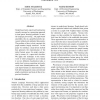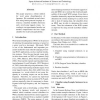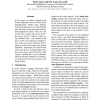10 search results - page 1 / 2 » Robust Semi-supervised and Ensemble-Based Methods in Word Se... |
TAL
2010
Springer
13 years 2 months ago
2010
Springer
Mihalcea [1] discusses self-training and co-training in the context of word sense disambiguation and shows that parameter optimization on individual words was important to obtain g...
NAACL
2007
13 years 5 months ago
2007
Graph-based semi-supervised learning has recently emerged as a promising approach to data-sparse learning problems in natural language processing. All graph-based algorithms rely ...
NLPRS
2001
Springer
13 years 9 months ago
2001
Springer
We propose a new ensembling method of Support Vector Machines (SVMs) based on Feature Space Restructuring. In the proposed method, the weighted majority voting method is applied f...
IJCNLP
2004
Springer
13 years 9 months ago
2004
Springer
This paper proposes a robust method for word sense disambiguation of Japanese. We combined several classifiers using heterogeneous language resources, a machine readable dictiona...
COLING
2008
13 years 5 months ago
2008
In this paper we explore robustness and domain adaptation issues for Word Sense Disambiguation (WSD) using Singular Value Decomposition (SVD) and unlabeled data. We focus on the s...



